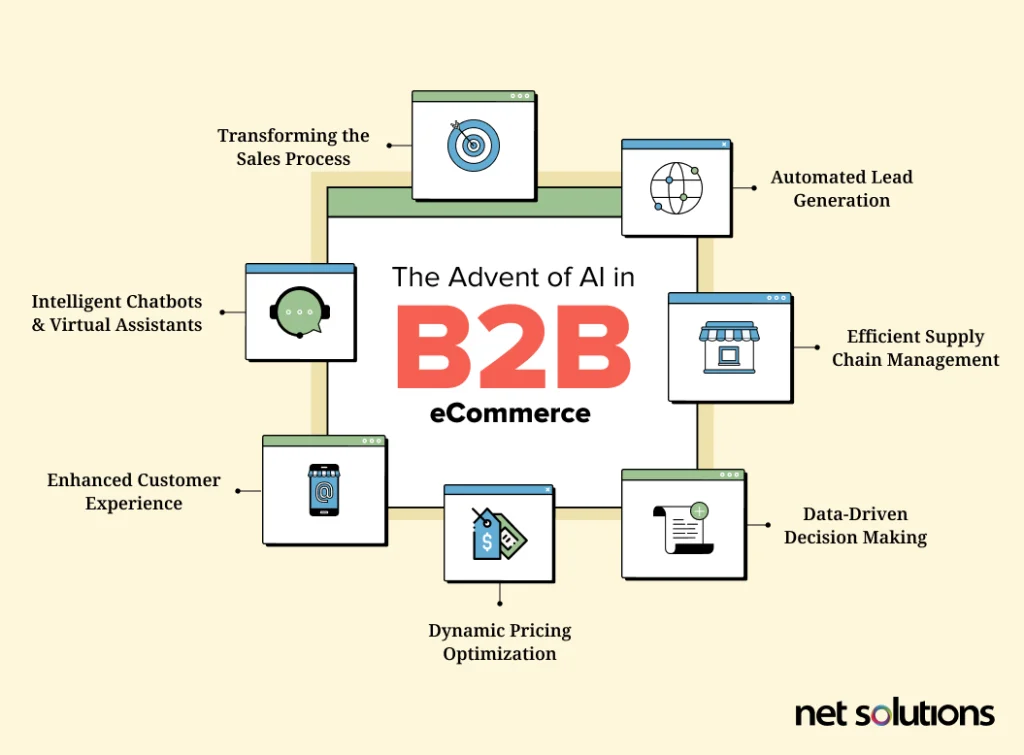The Future of B2B: Using AI Automation to Drive Success
The landscape of B2B is moving as companies increasingly transform to AI automation for calculated advantage. This transformation assures to improve efficiency and customer engagement via innovative innovations. The assimilation of these tools is not without its challenges. Recognizing how organizations can browse this advancing terrain will certainly be vital for future success. What factors will establish the efficiency of AI in this sector? The responses may redefine typical company versions.
Comprehending AI Automation in B2B
As organizations progressively look for efficiency, recognizing AI automation in B2B becomes crucial. AI Automation For B2B. AI automation describes making use of fabricated intelligence innovations to streamline and improve service procedures. In the B2B industry, this entails the integration of AI tools to take care of jobs such as data evaluation, consumer interactions, and supply chain operations. By leveraging artificial intelligence and natural language processing, business can boost accuracy, minimize human mistake, and quicken decision-making. Additionally, AI automation promotes the handling of large volumes of data, allowing organizations to remove beneficial understandings and optimize their operations. As companies browse this technical landscape, an extensive grip of AI automation's capacities will certainly encourage them to remain affordable and receptive to market needs
Trick Advantages of AI Automation for Businesses
While numerous services come to grips with raising operational needs, AI automation presents numerous benefits that can significantly improve their performance. One significant advantage is performance; AI systems can execute recurring jobs quicker and with higher accuracy than humans, thereby freeing and decreasing errors up staff members for even more calculated efforts. Additionally, AI automation makes it possible for data-driven decision-making by assessing substantial datasets promptly, supplying insights that inform business approaches. Expense reduction is another vital advantage, as automation lessens labor costs and maximizes source allowance. In addition, AI can improve scalability, allowing organizations to adjust to market changes promptly. Inevitably, the combination of AI automation fosters advancement, enabling business to remain affordable in a rapidly progressing landscape.
Transforming Client Experiences With AI
AI is reshaping client experiences by improving and making it possible for individualized communications interaction. Via the implementation of anticipating analytics, businesses can expect consumer needs and preferences, bring about more tailored solutions. Additionally, improving assistance procedures with AI technology improves efficiency and contentment, ultimately transforming the general consumer trip.
Personalized Interactions and Involvement

Predictive Analytics Execution
As organizations significantly seek to enhance customer experiences, applying anticipating analytics has become a crucial method in the B2B industry. By leveraging data-driven insights, companies can expect customer demands and choices, enabling them to customize their offerings a lot more efficiently. Predictive analytics makes use of historical information and advanced algorithms to anticipate future habits, permitting services to identify possible challenges and possibilities. This proactive strategy not only enhances client contentment but additionally promotes commitment by delivering timely and pertinent remedies. Additionally, anticipating analytics helps in source allotment, ensuring that advertising initiatives are focused on high-value leads. Inevitably, the integration of anticipating analytics equips B2B business with the devices essential to transform client communications and drive long-term success in a progressively affordable landscape.
Streamlining Support Procedures
Enhancing consumer experiences in the B2B sector prolongs past anticipating analytics; streamlining support processes plays an essential role. By integrating AI-driven options, businesses can boost and automate regular questions feedback times, leading to increased client contentment. Chatbots and virtual assistants offer 24/7 support, attending to customer requires immediately and lowering the worry on human agents. This automation allows teams to concentrate on complex issues, fostering more meaningful interactions. Furthermore, AI tools can evaluate support data to identify trends and locations for improvement, guaranteeing constant enhancement of service quality. Minarik AI. As organizations embrace these technologies, they position themselves as receptive and customer-centric, inevitably driving loyalty and company development in an increasingly competitive landscape
Enhancing Procedures and Processes
Simplifying operations and processes in B2B environments is important for improving general effectiveness. By enhancing process effectiveness and automating routine tasks, organizations can decrease hands-on errors and liberate important resources. This shift not just boosts performance however likewise allows teams to focus on strategic campaigns that drive development.
Enhancing Process Efficiency
Optimizing workflow efficiency is necessary for organizations looking for to decrease operational prices and boost efficiency. By analyzing existing procedures, companies can identify traffic jams and redundancies that impede performance. Implementing structured procedures boosts interaction and collaboration amongst groups, ensuring that jobs are completed more promptly. Using data-driven understandings allows companies to make enlightened decisions that improve operations further. Furthermore, adopting incorporated technologies can promote seamless details flow, decreasing the danger of hold-ups and mistakes. As organizations accept these adjustments, they not only cultivate a much more dexterous work setting but additionally position themselves to respond promptly to market demands. Eventually, concentrating on operations efficiency enables companies to assign sources effectively, driving long-lasting success in an increasingly competitive landscape.
Automating Regular Jobs
Many organizations are significantly turning to automation to deal with regular jobs, recognizing its prospective to substantially enhance operational effectiveness. By releasing AI-driven remedies, companies can improve repeated tasks such as information entry, invoice processing, and client questions. This change not just decreases human error however likewise maximizes beneficial staff member time, allowing staff to concentrate on value-added jobs and critical campaigns. In addition, automation can improve response times and service consistency, resulting in improved client contentment. As organizations browse an affordable landscape, leveraging automation for regular jobs ends up being crucial for optimizing workflows and keeping dexterity. Inevitably, this technique promotes advancement and drives growth, his comment is here positioning organizations for long-term success in the evolving B2B setting.
Enhancing Decision-Making Via Information Insights
As services navigate an increasingly complex landscape, leveraging information insights comes to be vital for educated decision-making. Minarik AI. By making use of ai-driven devices and advanced analytics, organizations can transform raw information right into workable intelligence. This enables them to determine patterns, projection market adjustments, and optimize techniques based upon real-time details. Boosted decision-making processes depend on data visualization methods, enabling stakeholders to conveniently make and interpret complex datasets swift, evidence-based choices. Furthermore, understandings acquired from consumer actions and market characteristics empower companies to tailor their offerings, improving customer complete satisfaction and driving growth. Eventually, taking advantage of information understandings not just boosts decision-making efficacy but also positions businesses to continue to be affordable in a swiftly advancing industry
Getting Rid Of Difficulties in AI Application
Although AI application holds the guarantee of significant functional renovations, companies commonly deal with a myriad of challenges that can hinder progression. Key barriers include data top quality problems, as many ventures fight with incomplete or irregular datasets needed for effective AI training. Additionally, resistance to transform within the workforce can restrain the adoption of AI technologies, as workers may be afraid job variation or lack the essential skills. Spending plan restrictions additionally present a challenge, restricting investment in the needed framework and skill. Integrating AI systems with existing processes can be intricate, requiring considerable time and resources (Growth Systems For B2B). Conquering these obstacles necessitates a critical method that consists of comprehensive training, modification management, and a commitment to constant renovation in AI initiatives
Future Patterns: The Following Frontier in B2B Automation
While the landscape of B2B automation remains to develop, arising fads are poised to redefine exactly how companies run. The integration of sophisticated expert system will help with a lot more tailored customer experiences, allowing services to customize remedies specifically to client needs. The increase of anticipating analytics will certainly allow companies to prepare for market changes and maximize decision-making procedures. Automation of regular jobs with robot procedure automation (RPA) will improve effectiveness, minimizing operational expenses significantly. Furthermore, the adoption of blockchain technology promises improved transparency and safety and security in transactions. As these innovations gain traction, firms will significantly utilize AI-driven understandings to promote partnership, improve supply chains, and enhance total performance, noting a transformative shift in the B2B landscape.
Frequently Asked Inquiries
What Sorts Of Services Can Benefit Most From AI Automation?

How Can Little Companies Apply AI Automation Effectively?
Small companies can implement AI automation properly by recognizing repeated tasks, picking easy to use tools, making certain appropriate training for employees, and progressively incorporating options to optimize operations while checking performance and adjusting methods based on responses.
What Are Typical Misunderstandings Concerning AI in B2B?
Typical misconceptions regarding AI in B2B consist of the belief that it is just for large ventures, that it guarantees instantaneous outcomes, which it can fully change human decision-making instead of increasing it.
How Does AI Automation Effect Staff Member Duties and Work Safety And Security?
AI automation improves employee functions by simplifying repetitive jobs, cultivating efficiency and advancement. While some fear task loss, it usually creates chances for upskilling and brand-new positions, ultimately improving work security with included worth and performance.
What Skills Are Needed to Handle AI Automation Projects?
To take care of AI automation projects, individuals need solid logical abilities, task management experience, proficiency in data analysis, understanding of artificial intelligence principles, effective communication abilities, and versatility to quickly altering technical atmospheres. These abilities assure successful implementation.
As businesses increasingly seek efficiency, comprehending AI automation in B2B comes to be essential. AI automation helps with the handling of big volumes of data, making it possible for organizations to extract important insights and optimize their procedures. While several organizations grapple with raising functional demands, AI automation provides various benefits that can significantly enhance their performance. Automation of regular jobs with robotic process automation (RPA) will certainly boost effectiveness, decreasing operational costs substantially - Minarik AI. Production, logistics, and customer service companies can profit most from AI automation